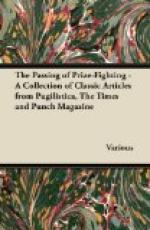THE TRAVELLING COMPANIONS.
No. IX.
Scene—The Burg Terrace at Nuremberg. Podbury on a bench, grappling with the Epitome of Spencer.
Podbury (reading aloud, with comments). “For really to conceive the infinite divisibility of matter is mentally to follow out the divisions to infinity, and to do this would require infinite time.” You’re right there, old cock, and, as I haven’t got it to spare, I won’t trouble you!—um—um ... “opposite absurdities”—“subjective modifications” ... “ultimate scientific ideas, then, are all representative of ideas that cannot be comprehended.” I could have told him that. What bally rot this Philosophy is—but I suppose I must peg away at it. Didn’t she say she was sorry I didn’t go in more for cultivating my mind? (He looks up.) Jove, here she comes! and yes, there’s that beggar Culchard with her! I thought he’d—how the dickens did he manage to—? I see what he’s after—thinks he’ll cut me out—twice over—but he shan’t this time, if I can help it!
Culchard (to Miss HYPATIA Prendergast). No, the Modern Spirit is too earnestly intent upon solving the problems of existence to tolerate humour in its literature. Humour has served a certain purpose in its day, but that day is done, and I for one cannot pretend to regret its decay.
Miss H. P. Nor I. In fact, the only humour I ever really appreciated is that of the ancient classics. There has been no true fun since ARISTOPHANES died. At least, I think not.
Podb. (catching the last sentence). Oh, I say, come, Miss PRENDERGAST. Have you ever read “The Jumping Frog”?
Miss P. I was under the impression that all frogs jumped. But I never read—I—ah—study.
Podb. (declining to be crushed). Well, I call MARK TWAIN funny anyhow. But I’m going in for study now. I am—honour bright! I’m swotting up SPENCER—look!
[He exhibits the volume proudly.
Miss P. And are you not enchanted by the logical lucidity of that great thinker?
Podb. Um—I should be more enchanted if I ever had the faintest notion what the great thinker was driving at. Look here—here’s a simple little sentence for you! (Reads.) “Let us therefore bear in mind the following:—That of the whole incident force affecting an aggregate, the effective force is that which remains after deducting the non-effective, that the temporarily effective and the permanently effective vary inversely, and that the molar and molecular changes wrought by the permanently effective force also vary inversely.” (With pathos.) And that’s only in an Epitome, mind you!
Miss P. Really, Mr. PODBURY, I see nothing particularly incomprehensible in that.




